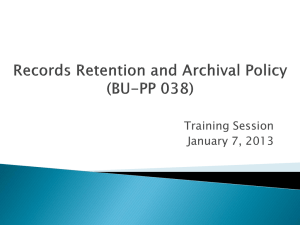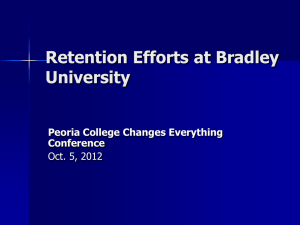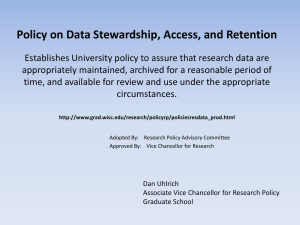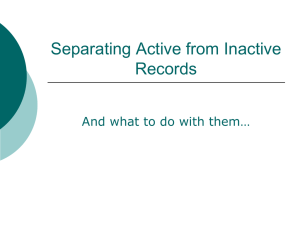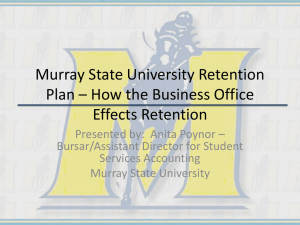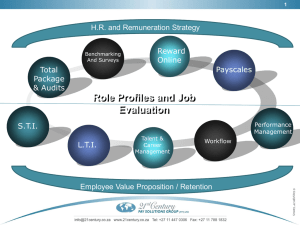New Employee Orientation
advertisement
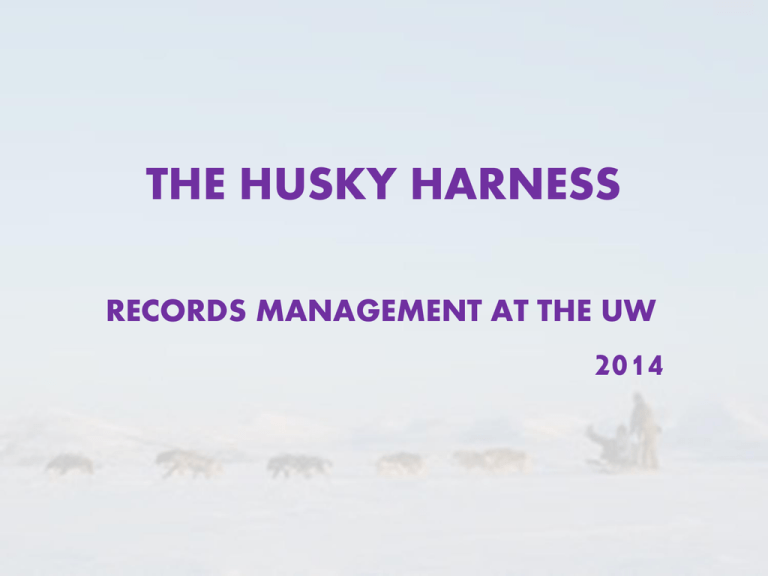
THE HUSKY HARNESS RECORDS MANAGEMENT AT THE UW 2014 Chose to Actively Manage Records Records Management o The application of systematic control to recorded information o A logical and practical approach to the creation, maintenance, use and disposition of records, and therefore to the information those records contain. What is Records Management? COMPLIANCE Preservation And Destruction of Public Records RCW 40.14 o Defines a record o Establishes authority for records retention and destruction o Requires the Records Management program at the UW UW Compliance Responsibility It is the general policy of the University to: o Create only the records it needs. o Retain records according to legally approved records retention schedules. o Maintain active and inactive records in appropriate storage equipment and locations. o Discard records when no longer required. o Preserve records of historical significance. o Identify and protect vital records. Records Management Responsibilities o Records Retention Schedules = The legal authority on how long records created and received by the University are retained. o Files Management (paper and electronic records) o Electronic records (email, scanning, databases, the Web, etc) = Responsible for establishing standards relating to University business requirements and needs which ensure the legal legitimacy of University record-keeping systems. o Training = Provide a wide range of services which are designed to help ensure that the University is meeting its record-keeping responsibilities. o Litigation and audit support = Manages and oversees University compliance with state and federal laws and regulations relating to the preservation and destruction of electronic and paper information. o Inactive Storage o o Retrieval and Refile Services Disposition process o Vital Records Identification, Protection, Recovery Responsibilities of Offices and Departments o Records Authorities o The Records Authority has final approval for the disposition of records and oversees the implementation of records retention schedules o Records Coordinators o The Records Coordinator administers all day-to-day transactions associated with the office's records-related functions. This can include files organization and maintenance, inactive records storage, and records destruction. The Records Coordinator also acts as liaison with Records Management staff. Why Care…What Is The Business Case? o Reduce Costs--Save time, save space, save money o Reduce Risk--Poor audit findings o Minimize Legal Exposure o Storage may be cheap, but litigation is expensive o Continuity of Business Operations in Case of a Disaster o Protect the Rights and Interests of Employees and Customers o Eliminates the need to produce records which have reached the end of their retention period–and—have been destroyed Managing Records: Records Retention Schedules o A Records Retention Schedule identifies and describes each type of record created and received by an office and specifies how long that record must be retained before it can be destroyed o All records—paper and electronic are managed through Records Retention Schedules WHO DETERMINES THE RETENTION PERIOD? Retention periods are based on state, federal, private sponsor requirements, and our administrative use of the records. These requirements are identified by the UW Records Management Office and approved by the State Records Committee. NOTE: Be aware that all records pertaining to ongoing or pending audits, lawsuits (or even reasonably anticipated lawsuits), or public disclosure proceedings must not be destroyed, damaged or altered until the issue is resolved and you are specifically advised that such records may be destroyed. Purpose of Retention Schedules o Assure compliance with state and federal requirements by clearly stating how long each record must be retained o Provide a guideline for weeding files and moving them to inactive storage o Identify records which can be purged from the files and destroyed o Identify Vital Records o Identify Archival records Legal Benefits of Systematic Scheduling o Regulations—Assures compliance with state and federal regulations o Risk—Reduce legal risk/Reduce risk from poor audit reports o Legal Fees—Avoids unnecessary legal fees incurred during Discovery through attorney review of records that could have been destroyed o Court Fees—Avoids Court fines imposed when documents cannot be retrieved in the time frame stipulated Legal Proceeding, Audit, or Public Records Request— Eliminates the need to produce records which have reached the end of their retention period What Do You Mean This Is A Record? RCW 40.14.010 Definition and classification of public records. As used in this chapter, the term "public records" shall include any paper, correspondence, completed form, bound record book, photograph, film, sound recording, map drawing, machine-readable material, compact disc meeting current industry ISO specifications, or other document, regardless of physical form or characteristics, and including such copies thereof, that have been made by or received by any agency of the state of Washington in connection with the transaction of public business. I Have To Keep This For How Long?!! If Everything is a Record and Management and Retention is based on Content not Format….. That Text Message is a Record? o o o o CAD Designs Databases Text Message/Twitters Information and data kept in a cloud computing environment o Web pages/Facebook pages o “Unofficial” records o Anything about university business that you recorded in some way UW General Records Retention Schedule http://f2.washington.edu/fm/recmgt/retentionschedules/gs/general • UW-GS 1 Committees, Councils, Associations And Boards • UW-GS 2 Environmental Health & Safety/Facilities Services Records • UW-GS 3 Curriculum Records • UW-GS 4 Materials That May Be Disposed of Without A Specific Retention Period • UW-GS 5 Electronic Mail • UW-GS 6 Financial Records (For non-grant/contract funded budgets) • UW-GS 7 Research and Grant/Contract Records • UW-GS 8 Personnel and Payroll Records • UW-GS 9 Student Records • UW-GS 10 General Office Administration Records • UW-GS11 Publication Records Departmental Retention Schedules Created for Departments that have unique records A searchable database of offices that have departmental retention schedules is available at: http://f2.washington.edu/fm/recmgt/retentionschedules/depar tmental UWGS 04: Dark Data http://f2.washington.edu/fm/recmgt/retentionsche dules/gs/general/uwgs4 o No administrative, legal, fiscal or archival requirements for their retention o May be disposed of as soon as they have served their reference purpose o Includes orphan documents and drafts o Includes list of electronic records that do not have to be printed or saved http://f2.washington.edu/fm/recmgt/Database_Printouts What About Email? Content matters, not format Same retention applies Email o Each employee is individually responsible for handling and maintaining records (including University email and other electronic records) in accordance with University policy and requirements. o Email that has a specific retention period should be retained electronically. o When messages are retained electronically, employees are responsible for making sure that their email remains accessible and readable for the full retention period. Email You Can Delete Most received and sent emails have a very transitory value. They have no administrative, legal, fiscal, or archival retention requirements and can therefore be deleted as soon as they have fulfilled their reference purpose. o Preliminary drafts o Routine replies/requests for information o Emails sent as reference or for informational distribution o Emails used to set-up or accept meetings o Announcements o Acknowledgements o Other Dark Data Email You Must Retain Other email messages that contain evidence of official University actions, decisions, approvals, or transactions must be retained according to an approved retention schedule. o Policy and procedure directives o Substantive decisions/instructions regarding matters of University business o Legal or audit issues o Approvals for purchase/hire or other actions to be taken o Final reports or recommendations o Receipts for purchases made electronically with a ProCard or CTA Quick Tips To Manage Email o Create electronic folders mirroring physical folders o Set a routine time to delete emails o Empty deleted folder: “take the trash to the curb” o Keep it simple! Managing Electronic Records Management of records depends on the content not the format o No difference between paper and electronic records o Both should be retrievable in 30 seconds o Find it, open it and read it for the full retention period o Same retention periods apply to either format o Ideally, the electronic filing system should duplicate your paper system o If part of the file is in paper and part electronic: o either paper or the electronic record can be your official copy o but you must be consistent with your choice of format for that particular type of record Scanning Records UW Scanning Requirements http://f2.washington.edu/f m/recmgt/scanning o Scanning does not automatically authorize the destruction of the paper o Following the UW Scanning Requirements o The scanned record becomes the official copy o The paper can be destroyed An Extra Concern o “E Discovery” o Public Records Requests o Audit o Court decisions and rules place substantial obligations on public and private organizations to: o Retrieve, preserve, and produce all electronic materials that could be relevant to pending or anticipated lawsuit or public records request or litigation o Exposure to possible liability and sanctions if obligations are not met The High Cost of Fines under the Public Records Act o 1994 PAWS vs UW the majority of records were protected but the Washington Supreme Court found that a grant proposal was not (the UW lost this one) o Department of Corrections was fined $750,000.00 in 2008 for not releasing records in an electronic format o 2013 the UW was fined for almost 1million dollars for not releasing records in a timely manner (we are appealing one of the fines) An Average of $20 Million Litigation o A corporation is sued for fraud. It fails to fully search and preserve records appropriately. o Plaintiff awarded $1.6 billion. o Coleman Holdings v. Morgan Stanley o Employee sues corporation. Defendant deletes some emails and loses back-up tapes. Judge tells jury to assume the missing emails would have hurt the corporation. Plaintiff wins $29.3 million. Zubulake v. US Warburg o Microsoft spends an average of $20 million per litigation What Are Vital Records? Vital Records are recorded information, regardless of medium or format, that MUST be protected in case of disaster Tasks Of The Vital Records Team o Identification of Vital Records o Identification of Potential Risks o Recommendations on Appropriate Methods of Protection o Responsibility for Coordinating the Recovery of Damaged Records Do You Know Where Your Records Are? o Paper Records o Electronic Records QUESTIONS? http://f2.washington.edu/fm/recmgt/ Barbara Benson bbenson@uw.edu 543-7950 Leela Yellesetty Leela23@uw.edu 543-0573 Cara Ball ballc2@uw.edu 543-6512 John Bolcer, UW Archivist jdbolcer@uw.edu 543-1929


